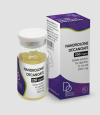 Nandrolone and Joint Health: Mechanisms, Benefits, and Risks
Nandrolone and Joint Health: Mechanisms, Benefits, and Risks
Nandrolone, a synthetic anabolic steroid, is widely recognized for its muscle-building properties. Beyond its use in bodybuilding and treating muscle-wasting conditions, nandrolone has potential benefits for joint health. This article explores how nandrolone affects joint health, examining clinical and anecdotal evidence.
Nandrolone decanoate (Deca-Durabolin) and nandrolone phenylpropionate (NPP) are derivatives of testosterone. Their modified chemical structure reduces androgenic effects while maintaining anabolic benefits, making nandrolone popular for promoting muscle growth with fewer side effects compared to testosterone.
Potential Benefits:
-
Collagen Synthesis: Nandrolone stimulates collagen production, a key component of connective tissues such as tendons, ligaments, and cartilage. Enhanced collagen production strengthens these tissues, improving joint support and health.
-
Anti-Inflammatory Effects: Nandrolone may exhibit anti-inflammatory properties by binding to cortisol receptors, which can help reduce joint pain and swelling. This effect is particularly beneficial for joint-related conditions like arthritis.
-
Synovial Fluid Production: Synovial fluid lubricates joints, reducing friction and wear. Some studies suggest that nandrolone can increase synovial fluid production, enhancing joint lubrication and reducing pain during movement.
-
Bone Density: Although not directly related to joints, nandrolone’s positive effect on bone density can indirectly support joint health by providing a stronger structural foundation for joints, potentially reducing the risk of joint injuries.
Studies and reports from athletes suggest that nandrolone can improve joint health and alleviate pain. For example, a study published in
“Arthritis & Rheumatism” found that nandrolone treatment significantly improved joint pain and physical function in patients with rheumatoid arthritis. Bodybuilders often report reduced joint pain and enhanced recovery when using nandrolone, especially during heavy lifting cycles. These perceived benefits are attributed to nandrolone’s ability to enhance collagen synthesis and reduce inflammation.
Conclusion:
Nandrolone exhibits properties that may benefit joint health, including increased collagen synthesis, anti-inflammatory effects, enhanced synovial fluid production, and improved bone density. Clinical studies and anecdotal evidence support its potential to alleviate joint pain and improve joint function. Consultation with a healthcare professional is advisable to evaluate the suitability of nandrolone based on individual health status and medical history. Exploring safer alternatives such as physical therapy, proper nutrition, and non-steroidal treatments is also recommended to support joint health.
Code:
https://duncanpharma.eu/product/nandrolone-decanoate/?v=11aedd0e4327




